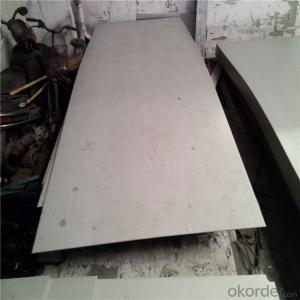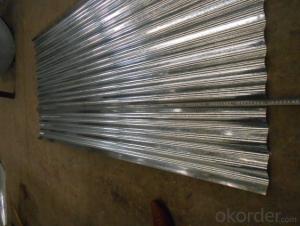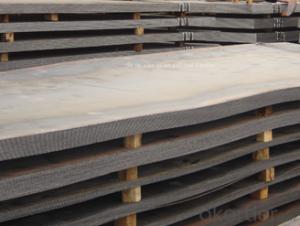Hot Rolled Steel Plate SS400 Thickness 5.0MM
- Loading Port:
- Tianjin
- Payment Terms:
- TT OR LC
- Min Order Qty:
- 500 m.t.
- Supply Capability:
- 10000 m.t./month
OKorder Service Pledge
OKorder Financial Service
You Might Also Like
Item specifice
DESCRIPTION:
GRADE: SS400, ASTM A36, A572, ST37,ST52, Q195, Q215, Q235,Q345, S235JR etc.
STANDARD: GB/T709-2006, ASTM A36, JIS G3101, DIN EN 10025, SAE 1045, ASTM A570
SPEC: 1)Width: 600-2500mm or 1000,1050,1250,1500,1800,2000mm
2)Thickness:1.5mm-200mm or as customers’ special requirements;
3)Length: 2-12m or as customers’ special requirements
FEATURES OF STEEL COILS
(1)Good ductility
(2)Good corrosion resistance
(3)Excellent abrasion resistance and fatigue strength
(4)Good weldability
(5)Oxidation resistant performance
(6)Excellent in high temperature
DETAILED PICTURES FOR STEEL COILS
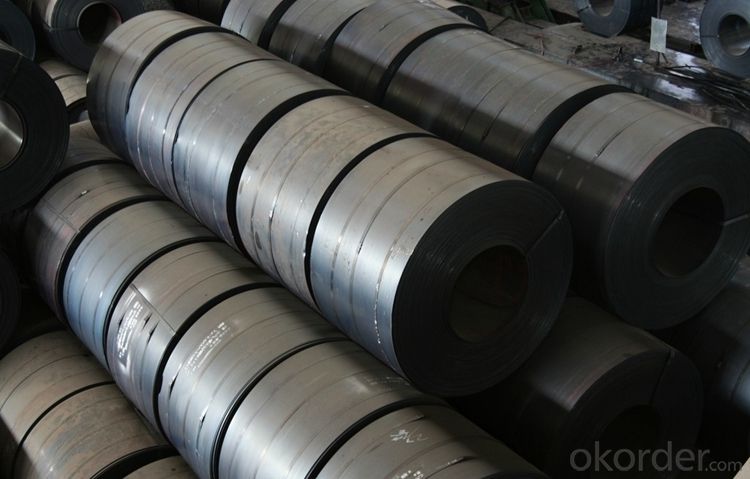
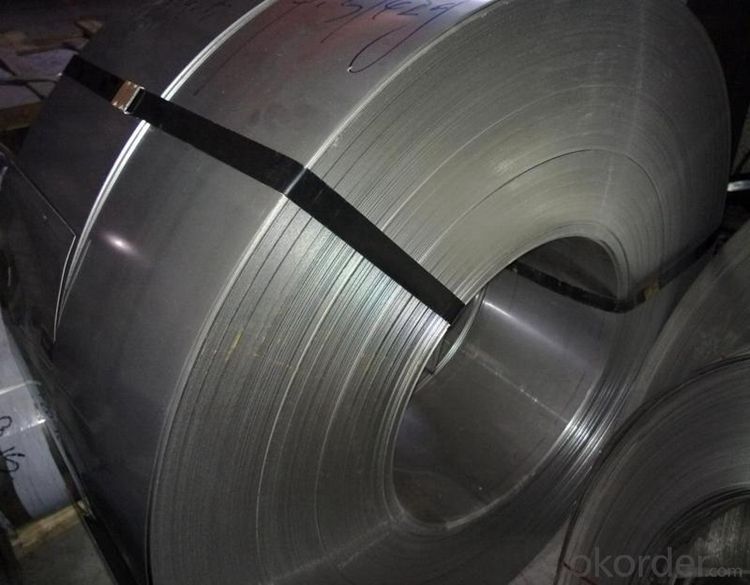
FAQ:
Q:Do you have OEM service?
A: Yes.Variety of products size,quality and quantity can be customized according to your need.
Q:Could you support free sample?
A:Yes.We can supply FREE samples.But the delivery charges will be covered by our customers.
Q:How about the delivery time?
A:Within 15-30days after receiving the deposit or L/C at sight.
- Q:Can steel sheets be used for manufacturing shipping pallets?
- Yes, steel sheets can be used for manufacturing shipping pallets. Steel is a strong and durable material that can withstand heavy loads, making it suitable for the construction of pallets. Steel sheets can be welded or bolted together to create a sturdy and reliable pallet structure. Additionally, steel pallets have the advantage of being resistant to moisture, pests, and fire, which can be important considerations for certain industries or applications. However, it is worth noting that steel pallets are generally more expensive than other materials such as wood or plastic, so the choice of using steel sheets for manufacturing shipping pallets would depend on specific requirements, budget, and intended use.
- Q:What is the difference between a perforated and expanded steel sheet?
- A perforated steel sheet and an expanded steel sheet are both types of metal sheets commonly used in various industries. However, they differ in terms of their manufacturing process and resulting characteristics. Perforated steel sheets are created by punching or drilling holes into a solid steel sheet. These holes can be of various shapes, sizes, and patterns, depending on the desired application. The holes in a perforated steel sheet allow for the passage of air, light, sound, or fluids, making them suitable for applications that require ventilation, filtration, or acoustic properties. Perforated steel sheets are commonly used in industries such as architecture, automotive, filtration, and mining. On the other hand, expanded steel sheets are produced by a unique manufacturing process known as expanding. The process involves cutting and stretching a solid steel sheet, resulting in a mesh-like pattern with diamond-shaped openings. The stretching process imparts strength and rigidity to the steel sheet while also reducing its weight. Expanded steel sheets are versatile and can be used in applications such as walkways, platforms, fencing, grating, and reinforcement. In summary, the main difference between a perforated and expanded steel sheet lies in their manufacturing process and resulting characteristics. Perforated steel sheets have holes punched or drilled into them, allowing for the passage of air, light, sound, or fluids. Meanwhile, expanded steel sheets are created by cutting and stretching a solid sheet, resulting in a mesh-like pattern with diamond-shaped openings. Both types of sheets have their unique advantages and are chosen based on the specific requirements of the application.
- Q:Can steel sheets be used for cladding or facades?
- Yes, steel sheets can be used for cladding or facades. Steel is a durable and versatile material that can provide strength, weather resistance, and aesthetic appeal to buildings. It can be shaped and customized to create different designs, textures, and finishes, making it a popular choice for cladding or facades in modern architecture.
- Q:Can steel sheets be used for elevator flooring or platforms?
- Yes, steel sheets can be used for elevator flooring or platforms. Steel is a durable and strong material that can withstand heavy loads, making it suitable for elevator applications. Additionally, steel sheets can be fabricated to meet the required dimensions and specifications for elevator flooring or platforms.
- Q:What is the difference between a smooth and embossed steel sheet?
- A smooth steel sheet refers to a sheet that has a flat and consistent surface without any texture or patterns. It is typically produced by rolling the steel through a series of rollers to achieve a smooth and uniform finish. Smooth steel sheets are commonly used in applications where a sleek and seamless appearance is desired, such as in architectural and interior design, automotive manufacturing, and appliances. On the other hand, an embossed steel sheet has a textured or patterned surface. This texture is created by pressing the steel sheet between embossing rollers, which impart a design onto the surface. The embossed pattern can be various shapes, such as diamonds, squares, or waves, and it adds a decorative and tactile element to the sheet. Embossed steel sheets are often utilized in industries like furniture manufacturing, signage, and decorative metalwork. In terms of functionality, smooth steel sheets are typically chosen for applications where a clean and unadorned surface is required, such as for painting, coating, or other surface treatments. They provide a blank canvas for further customization or finishing processes. In contrast, embossed steel sheets offer a visually appealing and distinct texture that can enhance the aesthetic appeal of a product or structure without the need for additional surface treatments. Additionally, the surface texture of a smooth steel sheet tends to be more resistant to fingerprints, smudges, and dirt accumulation compared to an embossed steel sheet. This makes smooth steel sheets easier to clean and maintain in applications where cleanliness is crucial, such as in food processing or healthcare industries. Overall, the main difference between a smooth and embossed steel sheet lies in their appearance, functionality, and suitability for specific applications. Whereas smooth steel sheets provide a clean, consistent, and versatile surface, embossed steel sheets offer a decorative and textured finish that can enhance the visual appeal of a product or structure.
- Q:What is the difference between a coated and uncoated stainless steel sheet?
- A coated stainless steel sheet is one that has undergone a protective layer or finish application, which can be a polymer or another material. This coating enhances the sheet's ability to resist corrosion, scratches, and other types of damage. Moreover, the coating offers decorative appeal by presenting various colors or textures. In contrast, an uncoated stainless steel sheet refers to a sheet without any additional protective layer or finish. It retains its natural state, with its inherent properties and characteristics. Uncoated stainless steel sheets are renowned for their exceptional resistance to corrosion, durability, and strength. They are commonly employed in situations where their natural properties are sufficient to withstand the intended environment. The primary distinction between coated and uncoated stainless steel sheets lies in their protective capabilities and appearance. Coated sheets provide an extra layer of protection against corrosion and damage, making them suitable for environments exposed to harsh conditions or corrosive substances. Additionally, they offer a wider range of design options due to the various coatings available. On the other hand, uncoated stainless steel sheets are preferred in applications where the inherent properties of stainless steel are adequate to meet the requirements. They are often utilized in architectural and structural projects, as well as in industries such as food processing, pharmaceuticals, and medical equipment, where hygiene and durability are crucial. To summarize, the difference between coated and uncoated stainless steel sheets lies in the additional protective layer and aesthetic options offered by the coating. Coated sheets provide enhanced resistance to corrosion and damage, along with a broader range of design choices. Uncoated sheets rely on their inherent properties for durability and strength. The selection between the two hinges on the specific application and the desired balance between protection, aesthetics, and cost.
- Q:What is the weight of a steel sheet?
- The weight of a steel sheet can vary depending on its dimensions and thickness.
- Q:How much is one meter for laser cutting steel plates?
- The algorithms on the market price are generally:Cut the price of one meter = the thickness of the material to be cut * 1.5 (excluding the price of material costs)(for example: compare 6 millimeters of low carbon steel plate laser cutting one meter price: 6 (plate thickness) * 1.5=9 yuan / meter10 mm low carbon steel, laser cutting one meter price: 10 (plate thickness) * 1.5=15 yuan / meter12 mm low carbon steel, laser cutting one meter price: 12 (plate thickness) * 1.5=18 yuan / meterAccording to this formula, we can get the price of cutting one meter with different thickness
- Q:Can the steel sheets be used for industrial machinery?
- Yes, steel sheets can be used for industrial machinery. Steel is a popular choice for the construction of industrial machinery due to its high strength, durability, and resistance to wear and tear. Steel sheets can be shaped, cut, and welded to create various components and parts required in industrial machinery. The versatility of steel allows manufacturers to design and fabricate machinery with precise specifications and requirements. Moreover, steel's ability to withstand heavy loads, extreme temperatures, and corrosive environments makes it suitable for use in a wide range of industrial applications.
- Q:What are the different coating options available for steel sheets?
- There are several coating options available for steel sheets, including galvanized coating, zinc coating, epoxy coating, powder coating, and paint coating. Each option provides different benefits such as corrosion resistance, durability, aesthetic appeal, and ease of maintenance. The choice of coating depends on the specific requirements of the application and the desired outcome.
1. Manufacturer Overview |
|
|---|---|
| Location | |
| Year Established | |
| Annual Output Value | |
| Main Markets | |
| Company Certifications | |
2. Manufacturer Certificates |
|
|---|---|
| a) Certification Name | |
| Range | |
| Reference | |
| Validity Period | |
3. Manufacturer Capability |
|
|---|---|
| a)Trade Capacity | |
| Nearest Port | |
| Export Percentage | |
| No.of Employees in Trade Department | |
| Language Spoken: | |
| b)Factory Information | |
| Factory Size: | |
| No. of Production Lines | |
| Contract Manufacturing | |
| Product Price Range | |
Send your message to us
Hot Rolled Steel Plate SS400 Thickness 5.0MM
- Loading Port:
- Tianjin
- Payment Terms:
- TT OR LC
- Min Order Qty:
- 500 m.t.
- Supply Capability:
- 10000 m.t./month
OKorder Service Pledge
OKorder Financial Service
Similar products
New products
Hot products
Related keywords
